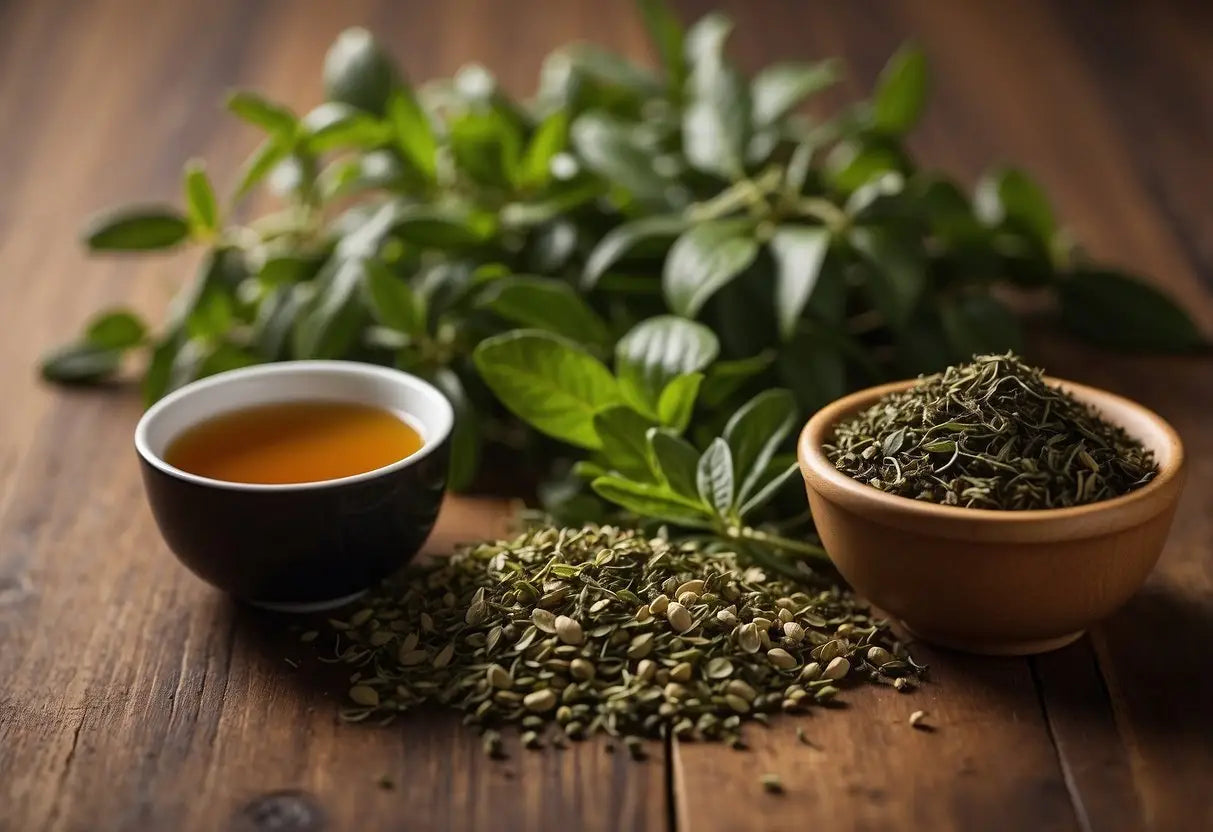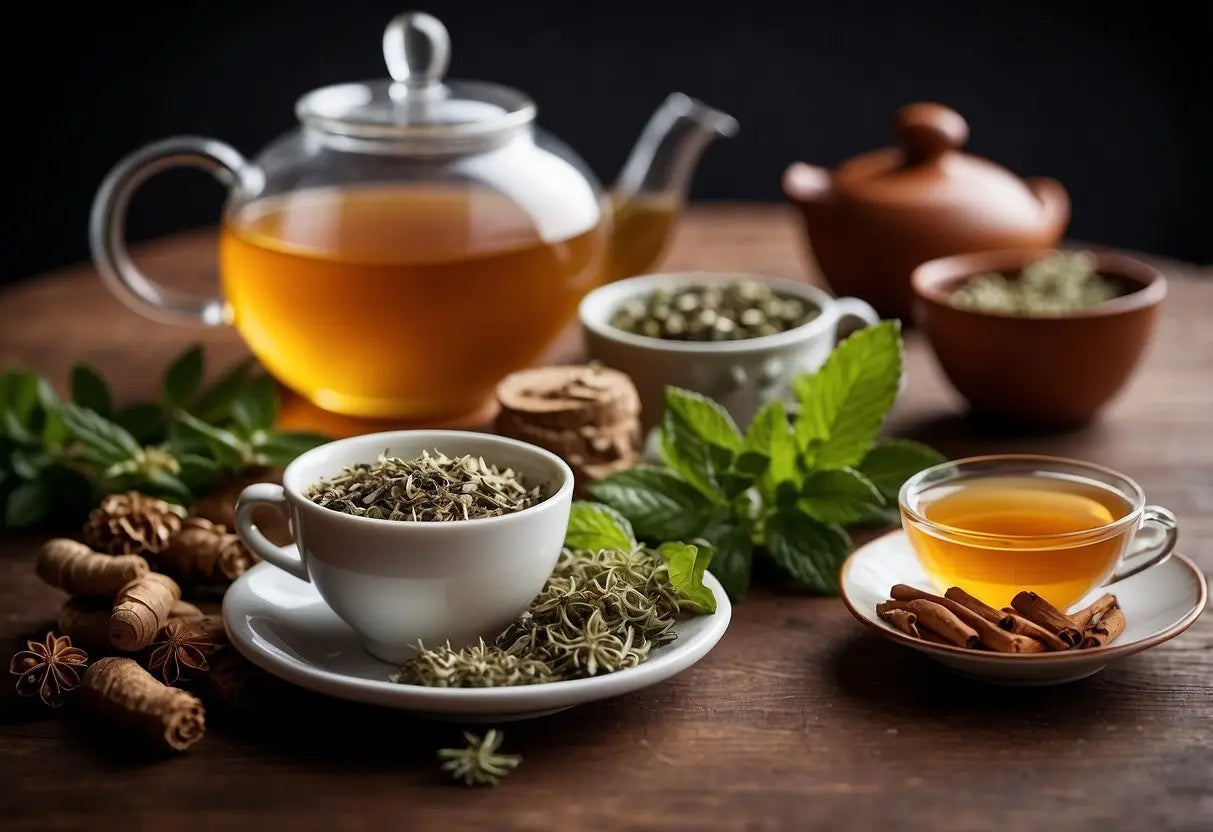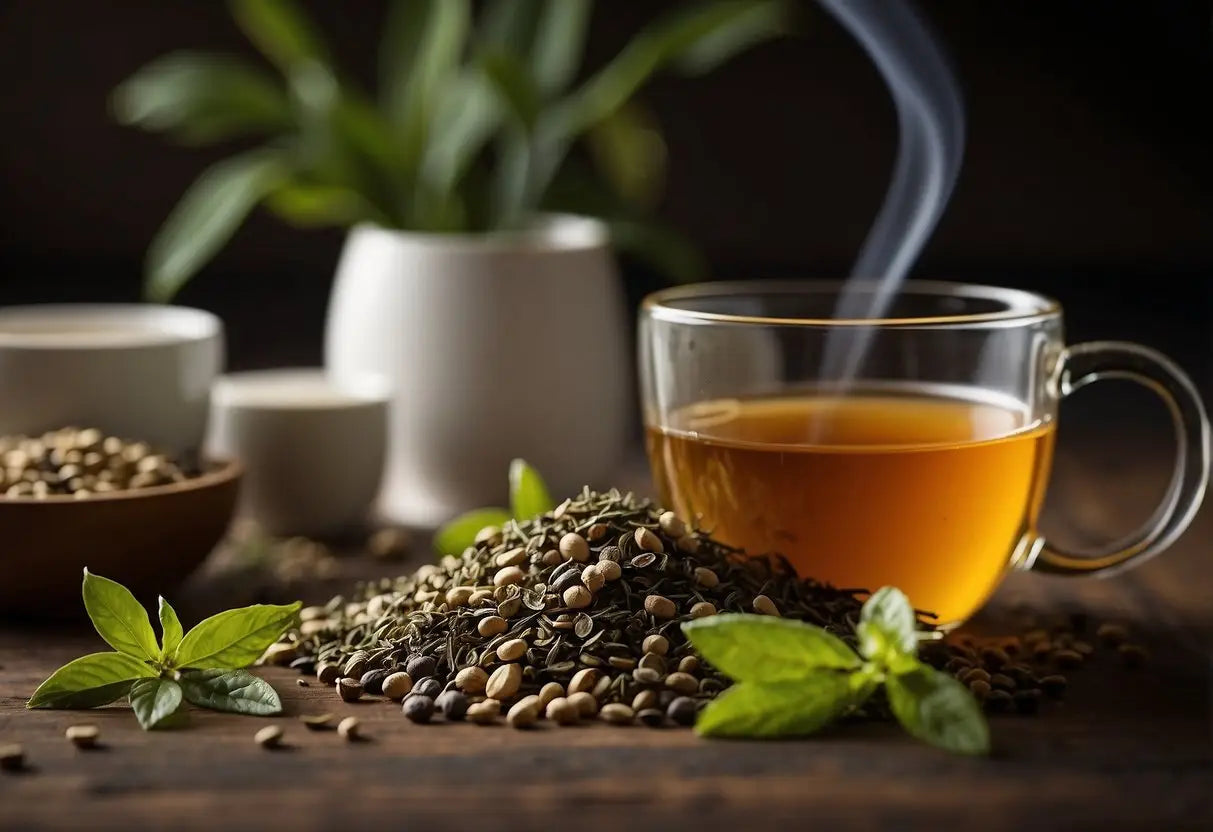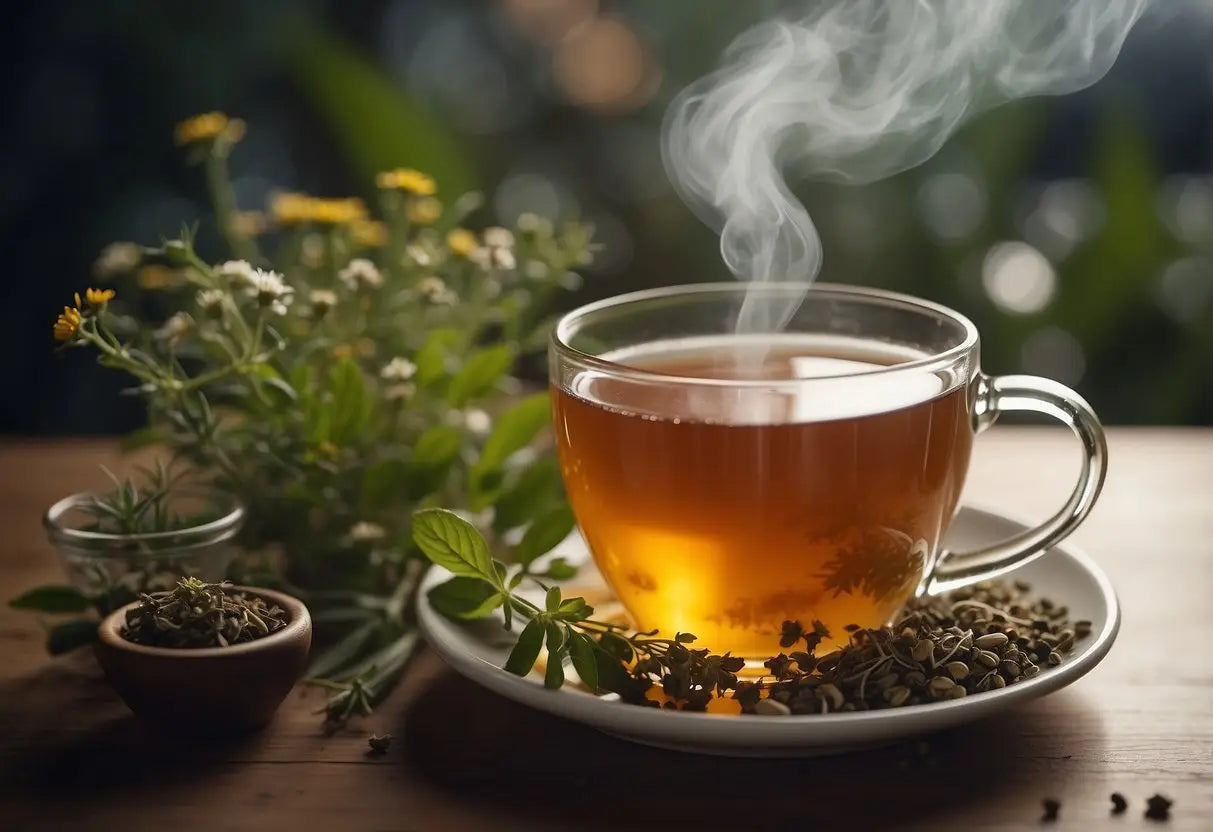Teas for Digestion
Tea offers several digestive benefits due to its natural compounds. Polyphenols, such as catechins, can aid in digestion by promoting the growth of good bacteria in your gut. This supports a healthy digestive system.
Peppermint tea helps in relaxing the muscles of your digestive tract. It can alleviate symptoms like bloating and stomach discomfort. This makes it a soothing option for digestive issues.
Ginger tea is known for its anti-inflammatory properties. It can help reduce nausea and improve digestion by enhancing gastric motility. Drinking ginger tea can be particularly beneficial for those with indigestion or an upset stomach.
Bestsellers
Chamomile tea has relaxing effects that can ease digestive discomfort. It’s often used to treat issues like irritable bowel syndrome (IBS). Chamomile’s calming effect on the stomach can help relieve gas and cramping.
Benefits Summary
| Tea Type | Key Benefits |
|---|---|
| Green Tea | Supports gut bacteria |
| Peppermint Tea | Relieves bloating and discomfort |
| Ginger Tea | Reduces nausea and improves motility |
| Chamomile Tea | Eases IBS symptoms |
Certain teas can also decrease inflammation in the digestive tract. This may relieve symptoms of conditions like gastritis or Crohn's disease. Choosing the right tea can be a simple way to enhance your digestive health.
Types of Tea for Digestion

Different teas can help improve digestion, each with unique properties. Herbal teas often have soothing effects, while true teas contain beneficial compounds.
Herbal Teas
Herbal teas are caffeine-free and include a variety of plants. Peppermint tea is well-regarded for easing bloating and gas due to its menthol content. Ginger tea can stimulate digestive enzymes and reduce nausea. Chamomile tea offers anti-inflammatory properties, helping with digestive issues such as indigestion and colic.
Other options include fennel tea, which can relieve abdominal cramps and regulate bowel movements. Licorice root tea has gut-healing effects but should be consumed in moderate amounts due to its potency.
True Teas
True teas come from the Camellia sinensis plant and include black, green, white, and oolong teas. Green tea contains catechins, which can speed up digestion and support gut health. Black tea has tannins that can soothe the intestinal lining and reduce inflammation.
Oolong tea aids digestion by breaking down fats and boosting metabolism. White tea is the least processed and is gentle on the stomach, promoting overall digestive health. For best results, choose naturally brewed, high-quality teas and avoid adding excessive sugar.
How Tea Aids Digestion

Tea can play a significant role in supporting digestive health. It stimulates digestive enzymes, leverages anti-inflammatory properties, balances gut microbiota, and soothes the digestive tract.
Digestive Enzymes Stimulation
Certain teas, like peppermint and ginger tea, are well-known for stimulating digestive enzymes. These enzymes are crucial as they help break down food more effectively, leading to better nutrient absorption and less digestive discomfort.
Peppermint tea specifically aids in the digestion of fats by increasing bile flow. Similarly, ginger tea promotes the production of saliva, gastric juices, and bile, which are essential for breaking down food in the stomach and small intestine.
Lao Ban Zhang
Anti-Inflammatory Properties
Many teas contain anti-inflammatory compounds that can support a healthy digestive system. For example, chamomile tea has anti-inflammatory agents that help reduce swelling and inflammation in the gut, alleviating symptoms such as bloating and abdominal pain.
Turmeric tea is another excellent option. It contains curcumin, a potent anti-inflammatory compound that helps reduce gastrointestinal inflammation, thus aiding in smoother digestion and relief from common digestive issues like irritable bowel syndrome (IBS).
Gut Microbiota Balance
Teas can support a healthy balance of gut microbiota, which is crucial for proper digestion. Green tea contains polyphenols that act as prebiotics, nourishing beneficial gut bacteria and creating an environment where these microbes can thrive.
A balanced microbiota helps in the efficient digestion of food, synthesizing vital nutrients, and strengthening the gut barrier. Additionally, the polyphenols in green tea help suppress the growth of harmful bacteria, thereby reducing the risk of infections and digestive distress.
Soothing Digestive Tract
Teas like licorice root tea and fennel tea are well-regarded for their ability to soothe the digestive tract. Licorice root tea helps coat the stomach lining with a protective layer, reducing irritation and promoting healing.
Fennel tea is also effective, helping to relax the gastrointestinal muscles and reduce symptoms such as bloating, gas, and cramps. This soothing effect can make digestion a more comfortable process, especially after meals.
Popular Teas for Digestion
Certain teas are known for their digestive benefits, helping alleviate various digestive discomforts and promoting overall gut health. Here's a detailed look at some of the most popular options.
Peppermint Tea
Peppermint tea is often recommended for its antispasmodic properties, which can help relax the muscles in your digestive tract. This can alleviate symptoms of bloating and gas. The menthol in peppermint tea may also soothe the digestive system, reducing nausea and indigestion.
It's best consumed after meals or when experiencing digestive discomfort. Peppermint tea is naturally caffeine-free, making it a good choice for any time of day. Be cautious if you have gastroesophageal reflux disease (GERD), as peppermint can sometimes exacerbate symptoms.
Ginger Tea
Ginger tea is another popular choice for digestive health. It's commonly used to relieve nausea, and its anti-inflammatory properties can help with overall digestive discomfort. Gingerol, an active compound in ginger, promotes the passage of food and fluids through the gastrointestinal tract, reducing bloating and constipation.
Drink ginger tea before or after meals to stimulate digestion. This tea also helps with motion sickness and menstrual discomfort. Fresh ginger root or pre-packaged ginger tea bags can both be effective.
Chamomile Tea
Chamomile tea is well known for its soothing effects. It can help relax the digestive muscles and treat issues such as irritable bowel syndrome (IBS) and colic. Chamomile contains natural compounds that reduce gas and inflammation, making it beneficial for a variety of digestive issues.
It's best consumed after meals or before bedtime. Chamomile tea also has mild sedative properties, which can aid in stress-related digestive problems. Its gentle nature makes it suitable for both adults and children.
Green Tea
Green tea offers numerous health benefits, including digestive support. It contains catechins, which can enhance digestion and improve bowel movements. Green tea can also help reduce inflammation in the gut and promote the growth of beneficial bacteria.
Consume green tea between meals to avoid interfering with iron absorption. It's best enjoyed in moderation due to its caffeine content. Green tea can help boost metabolism and support weight loss, contributing to overall digestive health.
Preparation and Consumption Tips

Proper preparation and timing are crucial when using teas for digestive benefits. Attention to these aspects can maximize the effectiveness and enjoyment of your tea.
Brewing Techniques
To get the most out of your digestion-friendly teas, start with high-quality ingredients. Use fresh, filtered water, as it impacts the flavor and benefits of the tea.
Temperature: Different teas require different brewing temperatures:
- Green tea: 160-180°F (70-82°C)
- Black tea: 200-212°F (93-100°C)
- Herbal tea: 212°F (100°C)
Steeping Time: Proper steeping time ensures optimal extraction:
- Green tea: 2-3 minutes
- Black tea: 3-5 minutes
- Herbal tea: 5-7 minutes
Use 1 teaspoon of loose tea or 1 tea bag per cup (8 oz). Cover the cup while steeping to retain essential oils and aromas.
For consistent quality, invest in a good-quality tea infuser or teapot. Avoid over-steeping, as it can cause bitterness and reduce the pleasantness of the tea.
Best Times to Drink Tea for Digestion
Timing your tea consumption can enhance digestive benefits. Drinking tea 30 minutes after meals helps in breaking down food and promoting efficient digestion.
Morning: Start your day with a cup of ginger or peppermint tea. These herbs stimulate digestive juices and prepare your stomach for the day ahead.
Afternoon: Post-lunch, opt for fennel or chamomile tea. Both teas are known to soothe the digestive tract and reduce bloating.
Evening: In the evening, choose a mild herbal tea like chamomile or lemon balm to aid digestion and promote relaxation without interfering with sleep.
Avoid drinking large quantities of tea on an empty stomach or right before bed. This can cause stomach discomfort or disrupt sleep.
Potential Side Effects and Considerations

When consuming teas for digestion, it is important to be aware of potential side effects. Understanding caffeine content, possible herb-drug interactions, and limitations for specific individuals will help you make informed decisions.
Caffeine Content Awareness
Certain teas, especially black, green, and some oolong, contain caffeine. Caffeine can cause symptoms like insomnia, increased heart rate, and nervousness in sensitive individuals.
Caffeine Content in Common Teas:
| Tea Type | Approximate Caffeine Content (mg per 8 oz) |
|---|---|
| Black Tea | 40-70 |
| Green Tea | 20-45 |
| Oolong Tea | 30-50 |
| Herbal Tea | 0 |
People who are sensitive to caffeine or have underlying health conditions should choose herbal teas or decaffeinated versions to avoid these issues.
Herb-Drug Interactions
Herbal teas contain various compounds that can interact with medications. For instance, St. John's Wort may reduce the effectiveness of birth control pills.
Medicinal interactions can also affect blood pressure, cholesterol, or blood sugar levels. Always consult with your healthcare provider before adding new herbal teas to your routine, especially if you are on medication.
Common Herb-Drug Interactions:
- St. John's Wort: Affects birth control and antidepressants.
- Ginger: Interacts with blood thinners and blood pressure medications.
- Ginkgo: May interfere with anticoagulants and anti-seizure drugs.
Limitations for Certain Individuals
Pregnant women, children, and those with certain medical conditions must exercise caution. For example, some herbs may induce uterine contractions, posing risks during pregnancy.
Certain digestive teas might also exacerbate issues for individuals with gastrointestinal conditions, like ulcers or acid reflux. Always read labels and consult healthcare professionals for personalized advice to avoid any negative impacts.
← Older post Newer post →











